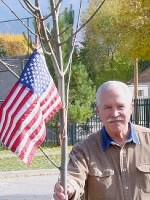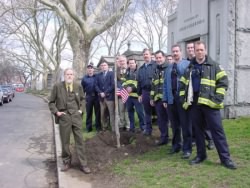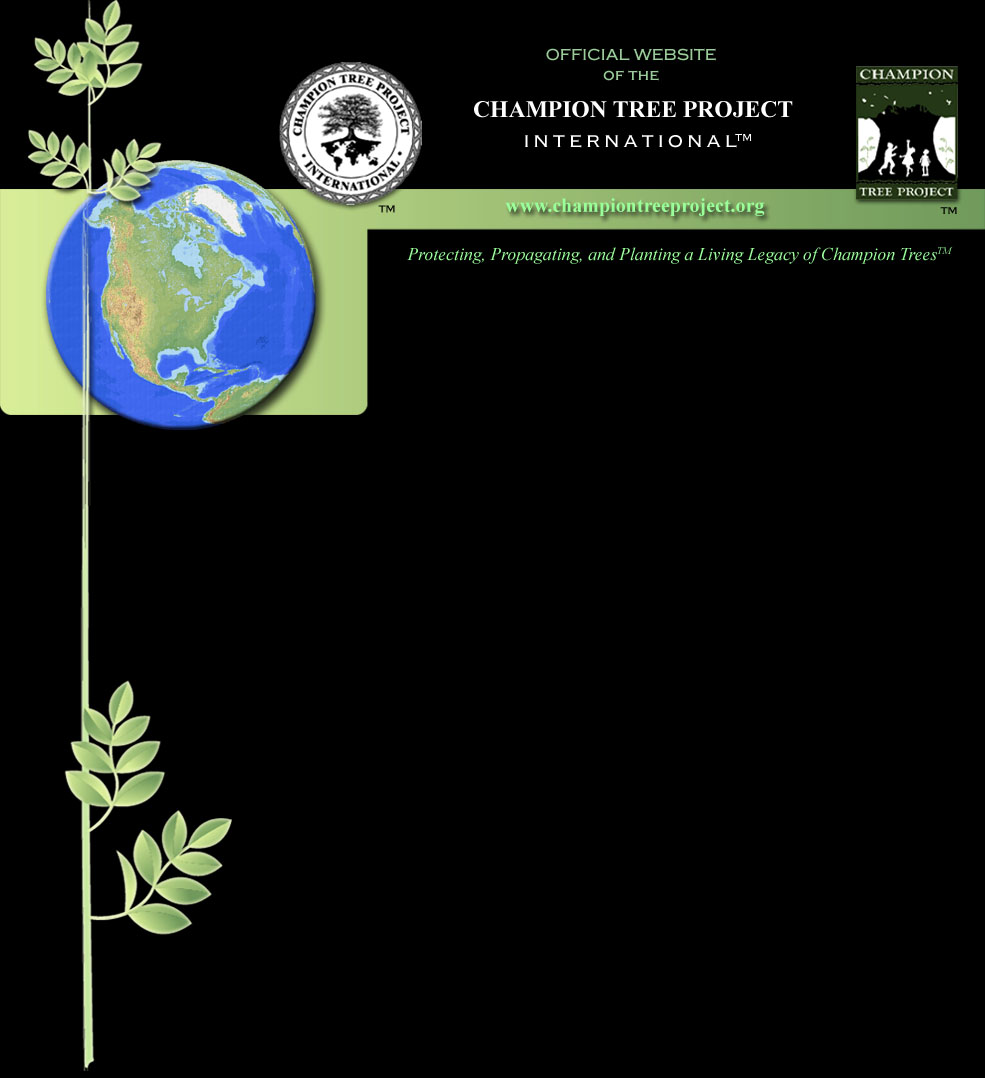
The future of America's
majestic trees has found new security as the National Tree Trust has agreed
to join the effort to collect and preserve genetic material from the nation's
champion trees. In a pioneering mission first introduced by Champion Tree
Project, tissue samples and DNA from the largest known examples of hundreds
of America's tree species will be gathered to learn more about their longevity
and growth, and to save them for future generations.
In what might be the most groundbreaking aspect of the project, scientists
and arborists will work to clone these tree species. This will allow anyone
to plant exact genetic duplicates of these champions, which stand as striking
examples of a natural resource essential to the health of the earth's ecosystems.
"A champion tree is the biggest and often the oldest specimen of its
species," explains David Milarch, a Michigan tree farmer who, along with
son, Jared, created the Champion Tree Project. "These great, green giants
had the genes and good luck to survive recent centuries of industrialization,
development, deforestation and devastation. They are the hardiest, sturdiest,
most resistant and best bred of their family and species. They are the gold
medallists of their kind."
Understanding the value of this project to the future of American forestry,
the National Tree Trust has committed itself as a full partner in the effort
to gather and protect the genetic material of the largest examples of the
nation's many tree species. "We are delighted to join in this important
mission, as it strikes directly at what the National Tree Trust is all about,"
explains George Cates, Executive Director of National Tree Trust. "America
trusts us to promote the growth and maintenance of trees in every kind of
community, rural or urban. What better way to enhance awareness of all that
trees give us than to use cutting-edge technology to preserve for future generations
the building blocks of these champions that come from all corners of the nation."
Champion Tree Project and National Tree Trust provide samples of all the collected
material to universities and research facilities for study. The cloning project
will allow anyone in future years to plant the genetic duplicates of the champions.
These duplicates may not attain the precise size of the champion itself --
environmental factors and proper care are key to the health of any tree planted
- but they have the genetic potential inherent within which allowed the original
champion to become a champion.
In addition to giving any American the opportunity to plant their own genetic
champion, the ability to propagate these duplicates will revolutionize community
forestry. For instance, the harsh environment faced by trees planted in urban
settings reduces their lifespan to miniscule proportions. American cities
will soon have an opportunity to plant the genetic champion of an appropriate
tree species. These urban trees will have the potential to resist the pollution
and severe treatment in a manner that allowed its "champion parent"
to thrive throughout the centuries, from an agrarian to an industrialized
society.
The project is already restoring community spirit. "In 1997, we collected
samples from the National Champion Silver Buttonwood in Key West, Florida,"
explains Milarch. "In 1998, Hurricane Georges severely damaged that tree.
Hurricane Irene killed it off in 1999. We were able to replace it with dozens
of clones from the champion. Nature took away what she gave us, but think
of what these new Champion Silver Buttonwood clones mean for the people in
the Keys who loved that old tree."
Aside from the elements, time is also an enemy. "There are more than
800 tree species in America that await collection of their genetics,"
explains Cates. "And not all the champions have been identified. In addition,
some were first registered as champions 60 years ago and may now have been
surpassed in size."
To help identify national and state champions, and to speed the collection
and preservation of samples before the trees disappear, National Tree Trust
and Champion Tree Project encourage businesses and individuals to join in
sponsoring the project. For information on contributing to the effort, contact
National Tree Trust at 1-800-846-TREE (8733). Technical support for the project
comes from a variety of academic sources, including scientists from the University
of Maryland, University of Florida, Western Michigan University and the International
Society of Arboriculture, among others.
The National Tree Trust is celebrating its 10th anniversary in 2000. For additional
information about National Tree Trust programs, visit www.nationaltreetrust.org.
Champion Tree Project, Inc. is a not-for-profit membership organization with
chapters incorporated in Michigan, Montana, Maryland, Florida and New York.
For more information about Champion Tree Project, visit www.championtreeproject.org.
-30-

 |
|
ChampTrees(tm) planted at 2002 Winter Olympic Games in Salt Lake City |
 |
|
ChampTrees(tm)
planted a 9-11 memorial in New York City |
 |